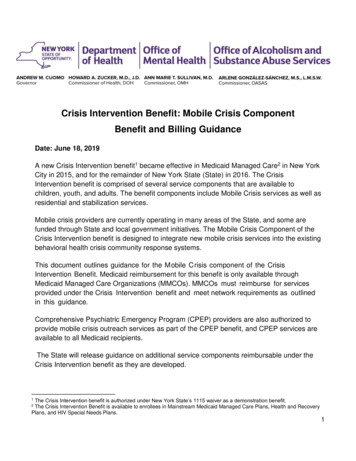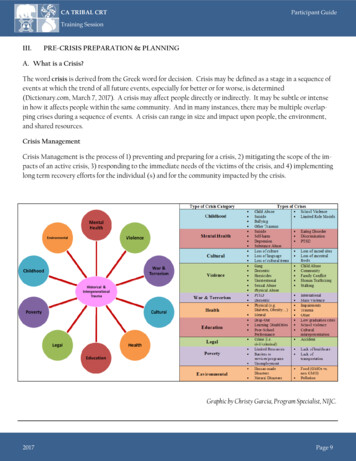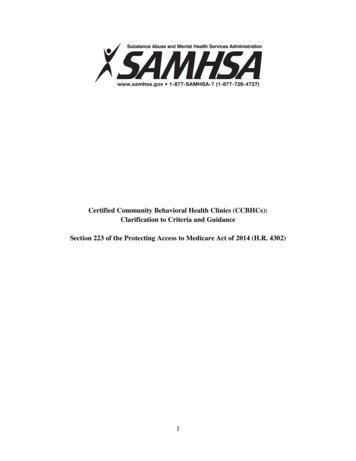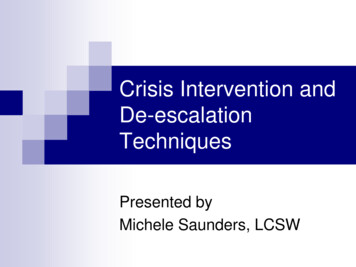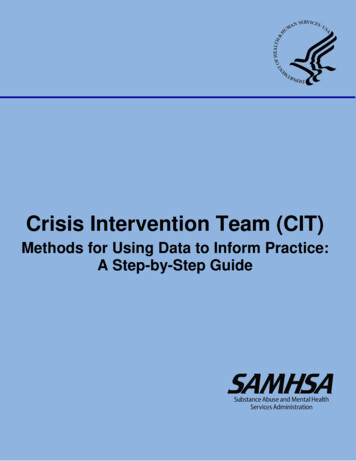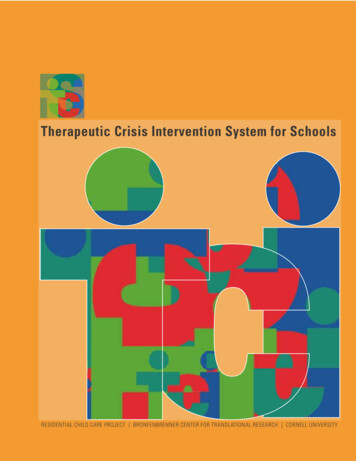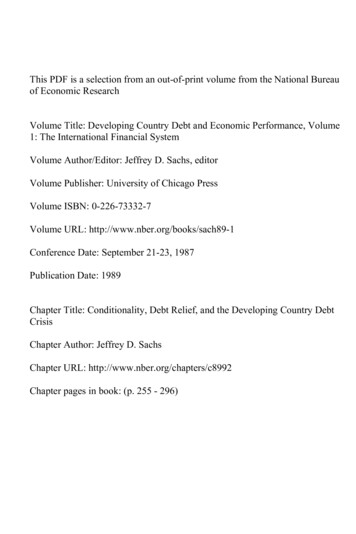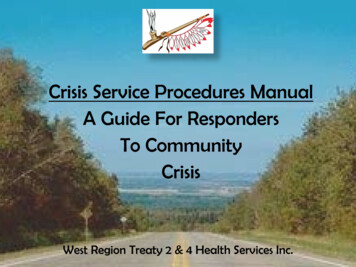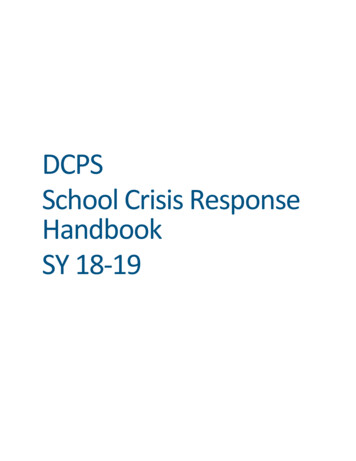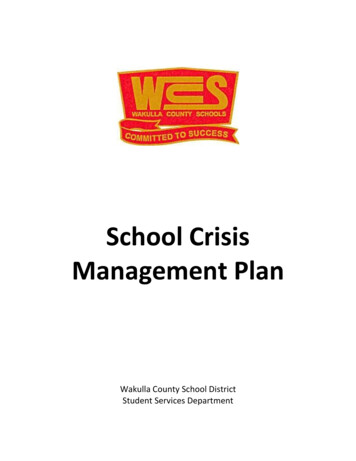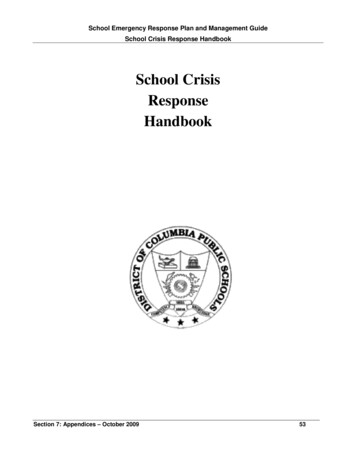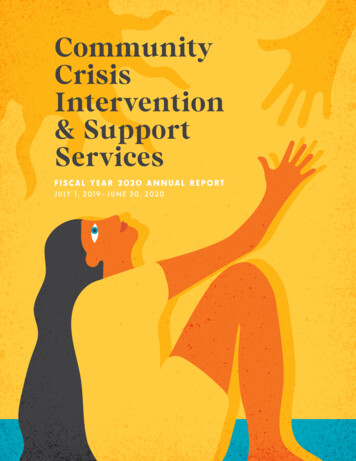
Transcription
CommunityCrisisIntervention& SupportServicesF I S C A L Y E A R 2 0 2 0 A N N U A L R E P O RTJ U LY 1, 2 019 – J U N E 3 0 , 2 0 2 0
Hope is beingable to see thatthere is lightdespite all ofthe darkness.— D ESMO ND T U T UTable of ContentsMission, Vision, Values.4Statement From Leadership.5Our Why.6Utah CrisisLine.8Utah WarmLine.12Mobile Crisis Outreach Teams (MCOT).14SafeUT. 16Safe Care Transition Follow-Up Program.22Training.27Community Relations.28
4COM M U NI T Y CRI S I S I N T E R V E N T I O N & S U P PO RT S E R V I C ESF I SCA L YEAR 2020 A N N UA L R E PORTSTATE M E N T FROMMissionLeadershipThe Huntsman Mental Health Institute (HMHI), formerly known as theUniversity Neuropsychiatric Institute (UNI), is committed to providingexcellence in mental health care to the Intermountain West community.The Huntsman Mental Health Institute (HMHI), formerly known as the University Neuropsychiatric Institute(UNI), a part of U of U Health, has been a long-standing pillar of health care excellence in our community.Through collaboration with community partners and strategic vision to increase access to critically neededservices and reduce stigma around support for mental health, its Community Crisis Intervention and SupportServices (CCISS) deliver and coordinate exceptional care to Utah residents from children to adults.VisionCCISS provides hope, healing, and connectedness through a continuum of crisis, referral, and data servicesavailable to all Utahns, anywhere and anytime. This includes (1) a crisis line accepting all calls and providingand dispatching support based on the assessed need of the caller, (2) mobile crisis teams dispatched towherever the need is in the community, (3) a crisis receiving and stabilization center, (4) a warm line to provideless acute services for emotional support, (5) text and tip based service provision via SafeUT, and (6) Safe CareTransitions for our highest risk patients.To provide leadership in patient-centered care, built on a foundationof knowledge, innovation, and human values.ValuesCompassion, innovation, collaboration, advocacy, communication,flexibility, adaptation, and empowermentMost recently, a generous donation by the Huntsman family is establishing the Huntsman Mental HealthInstitute (HMHI). Funding provided by the Huntsman family sets the foundation for: improving mental health resources for young adults increasing mental health resources in underserved communities advancing research for improved mental health treatment identifying the genetic basis of mental health conditionsWe are well poised and looking forward to the future growth of services, via support and collaboration withstakeholders and leaders across the state. As an academic medical center, it is our privilege to be part of asystem of care supporting people in their time of need and excelling in physical and behavioral health care.5
6COM M U NI T Y CRI S I S I N T E R V E N T I O N & S U P PO RT S E R V I C E SF I SCA L YEAR 2020 A N N UA L R E PORTAccording to the Gardner Institute analysis, a discussion group of participants agreed that anideal mental health system would: (1) Provide integrated mental and physical health services in a timelymanner, (2) Consistently use mental health screenings to assess individuals and identify risk, allowing for earlyintervention, (3) Ensure people have the resources to access necessary mental health services as well as safe,acuity-appropriate places to seek treatment.Our WhyIn August of 2019, a report analyzing Utah’s mental health system was published by the Kem C.Gardner Institute. This analysis in brief indicates:“Our country is in the midst of a mental health crisis. Increasingsuicide rates, untreated anxiety and depression among our youth,traumatic brain injuries, and serious mental illness are all signsof the need for accessible, affordable, and comprehensive mentalhealth services. Utah is not exempt from this crisis. Utah has a highrate of adults with mental illness, but a shortage of mental healthproviders. This study assesses the current state of mental healthservices in Utah, highlighting gaps in services, barriers to providingand accessing care, and considerations for improving the system. Itincludes qualitative research from discussion groups and interviewsheld with key industry leaders from Utah’s mental health system.”As a result of this analysis, multiple stakeholders across the state have come together to respond tothis plea—including social policy analysts, public and private health care representation, state andlocal officials, and many others—engaging in significant efforts to further enhance and developUtah’s ideal behavioral health system of care.HMHI/UNI is providing many of the key services for our Behavioral Health Crisis Response Systemof Care, which is fully aligned with SAMHSA National Guidelines for Behavioral Health Crisis Care.The following represent the National Guidelines for Behavioral Health Crisis Care essential elementswithin a “no-wrong-door” integrated crisis system:123REGIONAL CRISIS CALL CENTER: Regional 24/7 clinically staffed hub/crisis callcenter that provides crisis intervention capabilities (telephonic, text, and chat). Such a serviceshould meet National Suicide Prevention Lifeline (NSPL) standards for risk assessment andengagement of individuals at imminent risk of suicide and offer air traffic control (ATC) –quality coordination of crisis care in real-time;MOBILE CRISIS TEAM RESPONSE: Mobile crisis teams available to reach anyperson in the service area in his or her home, workplace, or any other community-basedlocation of the individual in crisis in a timely manner; andCRISIS RECEIVING AND STABILIZATION FACILITIES: Crisis stabilizationfacilities providing short-term (under 24 hours) observation and crisis stabilization servicesto all referrals in a home-like, non-hospital environment.Although there are many other services that will be incorporated into the continuum of acomprehensive system of care, these three programmatic components represent the three truecrisis service elements when delivered to the fidelity of the Crisis Service Best Practice guidelinesdefined in this toolkit. However, crisis systems must not operate in isolation, instead striving to fullyincorporate within the broader system of care so seamless transitions evolve to connect people incrisis to care based on the assessed need of the individual.7
8COM M U NI T Y CRI S I S I N T E R V E N T I O N & S U P PO RT S E R V I C ESUtah CrisisLineOVERVIEWThe Utah CrisisLine is dedicated to providing statewide quality phone services by licensed mentalhealth professionals, 24 hours a day, seven days a week. It is designed to provide compassionatesupport, assistance, risk assessment, and crisis intervention to individuals experiencing emotionaldistress or psychiatric crisis. Our goal is to provide prompt, compassionate, and effective help duringpersonal, family, or community emergencies.F I SCA L YEAR 2020 A N N UA L R E PORTHISTORYIn March 2011, the Huntsman Mental Health Institute (HMHI), formerly UNI, joined with Salt LakeCounty and Optum Health Salt Lake County to develop a continuum of crisis response programs for allSalt Lake County residents at no cost to those served. The CrisisLine was the first program rolled out.In the 2018 Legislative session, House Bill 41 (HB41) was passed, creating a statewide crisis line throughthe National Suicide Prevention Lifeline. HMHI/UNI was selected to manage this service. As of today,20 separate crisis lines managed throughout the state by numerous Local MentalHealth Authorities have been consolidated into one number offering 24/7 support.KEY FACTSStaff receive training through observation, written documents, call simulation, and review of bestpractice examples. They are expected to complete state required Crisis Worker Certification trainingwithin the first three months of hire. Supervision of staff is ongoing to ensure quality care for callersand to provide continued support and feedback for staff.TOTAL NUMBER OF CALLS RECEIVED70,097OUR MENTAL HEALTH CLINICIANS PROVIDE: Compassionate and nonjudgmental emotional support Suicide prevention services Crisis de-escalation services Education about mental health challenges, including healthy coping skillsand resiliency skills Information and guidance support for friends and family with mentaland emotional health challenges Follow-up services, information, and referralsTOP 5 REASONS FOR CALLING7.49%2.50%Psychosis orgrave disabilityconcernSubstance use45.99%Information onlySituational stress National Suicide Prevention Lifeline: 1-800-273-TALK (8255) Local number: 801-587-3000Weber County23,801Salt Lake CountyHarm to self3,367**Out of StateUtah County8,372*LocationNot Provided Dispatch for the Mobile Crisis Outreach Teams (MCOT) throughout the statePHONE NUMBERS CONNECTED TO THE UTAH CRISISLINE:2,2853,96016.31%25.79%TOP 5 REGIONS SERVEDCALLS REGARDINGA THIRD PARTY14,410*Callers have the right to remain anonymous and notprovide this information.**Calls made through the Lifeline are routed based on areacode. An individual may have a Utah-based area code butlive in another state and be connected to our center.9
10COM M U NI T Y CR I S I S I N T E R V E N T I O N & S U P PO RT S E R V I CE SLOOKING FORWARDWE DID IT! Because of actions taken by many advocates, the U.S. House of Representativesunanimously passed the bipartisan S. 2661, the National Suicide Hotline Designation Act.F I SCA L YEAR 2020 A N N UA L R E PORTBEHAVIORAL HEALTH CRISIS RESPONSECOMMISSION & PARTNERSROSS VANVRANKENHMHI/UNI, Executive DirectorDOUG THOMASTHIS BILL IS AN IMPORTANT STEP TO MAKING9-8-8Department of Health, Division of Substance Abuse and Mental Health, DirectorRIC CANTRELLUtah Attorney General’s OfficeDEONDRA BROWNChild AdvocateA NATIONWIDE THREE-DIGIT DIALING CODE FOR MENTAL HEALTH CRISESDOUGLAS GRAY, MDAND SUICIDE PREVENTION, OPERATIONAL.HMHI/UNI, PsychiatristTIM WHALENSalt Lake County Behavioral Health Services, DirectorAIMEE WINDER NEWTONIt passed the Senate in September 2020 and then went to the President’s desk to be signed intolaw in October 2020. The Federal Communications Commission (FCC) has approved 9-8-8,with a goal to have it available nationwide by July 2022.Mental health crises deserve a mental health response, and this law helps us getone step closer to that reality.Salt Lake County, Council ChairMELISSA HUNTINGTONFour Corners Community Behavioral Health, Clinical DirectorSTEVE ELIASONUtah House of RepresentativesDANIEL THATCHERUtah State SenatorJORDAN SORENSONUtah Hospital Association, Project Manager“THANK YOU!My brother is alive because of the work you all do.”— A caller whose brother received life-saving interventionfrom the Utah CrisisLine and first respondersEMMA CHACONUtah Division of Medicaid and Health Financing, Operations DirectorMARK FOOTE, MDIntermountain Healthcare, PsychiatristTOM ROSSBountiful Police Department, ChiefMARY JO McMILLENUtah Support Advocates Recovery Awareness (USARA), Executive Director11
12COM M U NI T Y CR I S I S I N T E R V E N T I O N & S U P PO RT S E R V I CE SF I SCA L YEAR 2020 A N N UA L R E PORTUtah WarmLineOVERVIEWThe Utah WarmLine is staffed seven days a week from 8 a.m. – 11 p.m. by Certified Peer SupportSpecialists (CPSS), who play a key part in implementing the Community Crisis Intervention &Support Services’ philosophy and goals. CPSS’s are a valued part of our team and have the abilityto connect and share experiences with clients in a way that clinicians and other individuals maynot. CPSS’s have the unique ability to share their own personal recovery journey to assist others in: Developing hope Creating opportunities for social inclusion Creating a secure base and sense of self Improving their use of coping skills Building supportive relationships Finding meaning in their own lives Feeling empoweredHISTORYIn June 2012, HMHI/UNI joined with Salt Lake County and Optum Health Salt Lake County to formthe WarmLine to serve residents of Salt Lake County.In the 2020 Legislative session, House Bill 32 (HB 32) required the Division of Substance Abuse andMental Health to implement a statewide warm line. HMHI/UNI was provided the support needed toexpand the WarmLine throughout the state of Utah.PHONE NUMBERS CONNECTED TO THE UTAH WARMLINE: 1-833-SPEAK-UT Local number: 801-587-1055KEY FACTSStaff on the Utah WarmLine utilize the Recovery Model approach to provide care to the callers. TheRecovery Model is a holistic, person-centered approach to mental health and substance dependencedisorders. It focuses on the idea that recovery is possible and that it is a journey, not a destination.TOTAL NUMBER OF CALLS RECEIVED28,251RECOVERY IS NOT SEEN AS A LINEAR PROCESS AND FOCUSES ON FOUR SPECIFIC AREAS:1234HEALTH: overcoming or managing one’s symptoms and making informed, healthy choicesthat support physical and emotional well-beingTOP 5 REASONS FOR CALLINGTOP 5 REGIONS SERVEDHOME: having a stable and safe place to livePURPOSE: conducting meaningful daily activities and having the independence, income,and resources to participate in societyCOMMUNITY: having relationships and social networks that provide support, friendship,love, and hope1.55%Physical health.42%Substance use677Weber County38.08%Situational stressUtah County2,398**13.25%Other92446.69%8,972Mental healthSalt Lake CountyLocation notprovided3,842*Out-of-state“My heartfelt thanks and sincerest gratitude for the WarmLine, staff, andsupport and services offered. I appreciate being able to call and get help –everyone is so nice, warm, and kind.”— A WarmLine caller*Increased capacity for Utah callers by re-routing out-of-state calls to applicable state-based resources effective November 1, 2019.**Callers have the right to remain anonymous and not provide this information.13
14COM M U NI T Y CR I S I S I N T E R V E N T I O N & S U P PO RT S E R V I CE SMobile CrisisOutreach TeamsF I SCA L YEAR 2020 A N N UA L R E PORTHISTORYIn 2012, HMHI/UNI joined with Salt Lake County and Optum Health to fund five MCOT teams inSalt Lake County.In 2019, the Utah Behavioral Health Crisis Response Commission recommended and legislativelyfunded four more teams, in Weber, Davis, Utah, and Washington counties.OVERVIEWThe Mobile Crisis Outreach Team (MCOT) program is designed to provide rapid, community-basedcrisis intervention services to residents of Salt Lake County at no cost to the client. This servicewas designed to be a third part of Salt Lake County’s Emergency Response System, respondingspecifically to mental and behavioral health crises in the community. MCOT may respond directlyto the individual or family in need, as well as in conjunction with law enforcement and EMS. Theservice operates 24 hours a day, seven days a week and may be dispatched through the statewideCrisisLine. The team is staffed by a licensed mental health professional, who has specific training aseither a Mental Health Officer or Designated Examiner, and a Certified Peer Support Specialist.In the 2020 Legislative session, House Bill 32 (HB 32) expanded the Mobile Crisis Outreach Teamgrant program to fund additional teams in rural areas. The Local Mental Health Authorities that weregranted this funding included Bear River Mental Health Services, Northeastern Counseling Center,Healthy U Behavioral Summit County, Four Corners Community Behavioral Health, and San JuanCounseling Center.KEY FACTSOUR TEAMS PROVIDE:TOTAL NUMBER OF CONTACTS Face-to-face assessment for voluntary and involuntary hospitalization or to create a plan forthe individual to remain in the community3,567 De-escalation Peer support Advocacy Referrals Crisis response planning66%34%Adult“I was stressed out to the point I could not function, having bad side effectsfrom anti-depressants, and unable to sleep. MCOT was sent out for an outreach,and I was able to talk about feeling anxious about financial and relationshipstressors. The team provided support, validation, and encouragement and talkedabout ways to address harmful thought processes like guilty feelings. I wasgiven strategies for self-care and resources for therapy, even without insurancecoverage. I can’t believe they would come out to my home and spend the time tohelp me in this way. I appreciate this so much. You have been life savers for me.”— A client who used MCOT servicesYouthTOP 5 REASONS FOR OUTREACH5.72%6.95%Other symptoms and signsinvolving emotional stateWorries10.25%27.04%UnhappinessSuicidal ideation10.98%Mental disorder not otherwise specified15
16COM M U NI T Y CR I S I S I N T E R V E N T I O N & S U P PO RT S E R V I C E SF I SCA L YEAR 2020 A N N UA L R E PORTSafeUTHISTORYOVERVIEWThe SafeUT smartphone app is a statewide service that provides real-time crisis intervention toUtah’s students, parents, and educators at no cost. SafeUT was developed by the legislativelycreated SafeUT Commission, chaired by the Utah Attorney General’s Office. SafeUT allows studentsin crisis to open a two-way messaging service with master’s level clinicians, call a crisis counselordirectly, or submit confidential tips to school administrators on bullying, threats, violence, etc. The appis staffed by master’s level trained crisis counselors at HMHI/UNI 24 hours a day, 365 days a year.ENROLLMENTEnrolled schools are listed within the SafeUT app, andschool administrators are trained to handle submittedtips received through the app. At the end of the 2019-20academic school year, 87.8% of all Utah K-12 schoolsand universities (including public, private, and charter)had been enrolled in SafeUT. All tips submitted throughthe app are immediately reviewed by HMHI/UNI staff.Non-urgent tips are sent daily to the appropriate schooladministrators, and tips of a more threatening nature(including violence or planned school attacks) are triagedby crisis counselors who may involve law enforcementand administrators to quickly resolve the crisis. Duringthe 2019-2020 academic school year, the SafeUT appreceived tips about 201 unique verified school threats,which included reports of explosives, guns, knives, andplanned school attacks.STUDENTS WHO HAVE ACCESSTO THE APP802,373Suicide is the leading cause of death for youth in the state of Utah. After studying the issue, theUtah Attorney General’s Office and Sen. Daniel Thatcher proposed legislation in 2014 to form acommission to explore solutions. The legislation passed, and the commission was led by the UniversityNeuropsychiatric Institute (UNI), already renowned for their excellence in crisis call support. In 2015,the School Safety and CrisisLine legislation (SB 175) sponsored by Sen. Thatcher and Rep. SteveEliason passed the Utah State Legislature, designating HMHI/UNI as the crisis services provider andcreating an active commission, chaired out of the Attorney General’s Office, for implementation. TheSafeUT app became available to middle and high schools in early 2016.DEVELOPMENT & EXPANSIONThe SafeUT program was developed with funding from the Utah State Legislature in collaboration withthe Utah Attorney General’s Office, HMHI/UNI and U of U Health, the Utah State Board of Education,and the Utah Anti-Bullying Coalition. In 2018, SafeUT expanded to Utah higher-ed institutions and Utahtechnical colleges. In 2019, SafeUT expanded services to the Utah National Guard.In the winter of 2020 SafeUT is expanding services for Utah first responders in the form of SafeUTFrontline, which will be available for law enforcement officers, fire, EMS, health care workers, andother front-line workers and their families.TOTAL STUDENT REACH87. 8%Total students89.9% of public school districts100% of public high schools100% of public middle schools84.4% of public elementary schools88.9% of charter K-12 schools84.8% of higher ed *45.9% of private K-12 schools* Westminster College, BYU, and LDS Business College not enrolled.17
18COM M U NI T Y CR I S I S I N T E R V E N T I O N & S U P PO RT S E R V I CE SF I SCA L YEAR 2020 A N N UA L R E PORTKEY FACTS – TIPS & THREATSKEY FACTS – CHATS & LIFE-SAVING INTERVENTIONSSafeUT enables a student, parent/guardian, or educator to call or send a text message chat in amessaging platform inside the app to a SafeUT crisis counselor, or submit a confidential tip to schooladministrators on concerns like bullying, threats, violence, weapons, and planned school attacks,along with other school-related concerns.Licensed clinicians in our 24/7 CrisisLine call center respond to all incoming chats and callsby providing supportive or crisis counseling, suicide prevention, and referral services. SafeUTcan help anyone with emotional crises, bullying, relationship problems, mental health, or suiciderelated issues.TOTAL TIPSReceived from August 1, 2019 to May 31, 2020If a SafeUT user is actively attempting suicide or has plans to harm themselves in the immediatefuture, SafeUT clinicians will work in coordination with first responders/school personnel to initiatean active rescue (life-saving intervention).8,70213%TOTAL THREAT TIPSReceived from August 1, 2019 to May 31, 2020294TOTAL CHATSReceived from August 1, 2019 to May 31, Knives16%15%DepressionWeapons21%30%BullyingPlanned school attacksSUICIDE. 1,808 tipsGUNS. 133 tipsDEPRESSION. 741 tipsWEAPONS. 43 tipsBULLYING. 991 tipsDRUGS. 612 tipsCUTTING. 499 tips279resulted in2611,15720,436CHATS FROMEDUCATORSCHATS FROMPARENTSCHATS FROM STUDENTSK–HIGHER EDPLANNED SCHOOL ATTACKS. 89 tipsLIFE-SAVING INTERVENTIONS INITIATEDReceived from January 1, 2019 to May 31, 2020KNIVES. 23 tipsEXPLOSIVES. 6 tipsPOTENTIAL SCHOOL THREAT TIPS Received from August 1, 2019 to May 31, 2020VERIFIEDTIPS21,854201UNIQUE VERIFIEDSCHOOL THREATS300583FROM JAN. 2019TO DEC. 2019283FROM JAN. 2020TO MAY 202019
20COM M U NI T Y CR I S I S I N T E R V E N T I O N & S U P PO RT S E R V I CE SF I SCA L YEAR 2020 A N N UA L R E PORTSAFEUTNGCOMMISSION & PARTNERSIn the 6 months since launching SafeUTNG, in collaboration with the HMHI/UNI, U Health IT, andthe Utah National Guard, SafeUTNG has had more than 1,000 downloads and continues to helpour service members, civilian personnel, and their families who may be struggling. Users of the appconnect with a master’s level clinician 24/7/365 confidentially and at no cost to them. Brig. Gen.Michael J. Turley, adjutant general, Utah National Guard, said it best: “I strongly recommend eachand every Service Member download the SafeUTNG app, whether they feel they are in a crisis ornot. I have full faith and confidence in the behavioral health providers working behind the scenesat HMHI/UNI to make this app possible. We’ve seen firsthand how it can save lives.” Free, N. (2020)SafeUTNG App Reporting Early Success. Public Affairs Office.RIC CANTRELL, Commission Chair, Utah Attorney General’s OfficeCHRISTY WALKER, Utah Public Education SystemSPENCER JENKINS, Utah System of Higher EducationTERESA BRECHLIN, Utah Department of HealthREP. STEVEN ELIASON, Utah State House of RepresentativesSEN. DANIEL THATCHER, Utah State SenateRACHEL LUCYNSKI, Huntsman Mental Health Institute / University Neuropsychiatric InstituteKEN WALLENTINE, Law Enforcement & Emergency ResponseReceived from Dec. 6, 2019 through June 30, 2020AMANDA ALKEMA, Utah Department of Human ServicesBARBARA STALLONE & PAM HAYES, Representatives of the Public134MICHELLE BUSCH-UPWALL, Staff to the CommissionCHATS221,143TIPSDOWNLOADS“My cousin has a daughter named Emma [who was] struggling. she wasusing the SafeUT app on Saturday the 8th of February. Someone namedBryce [a SafeUT clinician] was texting back and forth with her as sheproceeded to try to take her life. Her parents and I are reaching outbecause we want to tell someone, anyone, everyone. The SafeUT appand Bryce saved her life. Bryce had gotten enough information to figureout who she was and send the police and paramedics to save her. shesurvived and is getting help. I know you guys know how important this is,but as someone who has worked and volunteered in a similar capacity. Ithought perhaps you. and Bryce if you can find him, might want to know2020 BEST OF STATE AWARDBest Web-based Community Resourceshe lived. This app saved their daughter’s life and I am so grateful for youand your work.”— Message from a grateful family member21
22COM M U NI T Y CR I S I S I N T E R V E N T I O N & S U P PO RT S E R V I C E SSafe CareTransitionFollow-UpProgramPROGRAM DESCRIPTIONThe Safe Care Transition Follow-up Program at the HMHI/UNI provides telephonic follow-up supportfor individuals discharged home from HMHI/UNI, the South Jordan Medical Center’s EmergencyDepartment (SJMC ED), and the University of Utah Medical Center’s Emergency Department(UUMC ED) who indicated any level of suicidal ideation or intent during their visit. The program ismade possible by a joint effort from the Utah CrisisLine, Utah WarmLine, and the Salt Lake CountyMobile Crisis Outreach Teams. The program provides support, resource assistance, risk assessment,Counseling on Access to Lethal Means (CALM), and crisis intervention via telephonic encounters.PROCEDURE & GOALSFOUR CARING CONTACTS ARE PROVIDED VIA PHONE OVER 90 DAYS: 1-3 days post discharge 7-10 days post discharge 30-60 days post discharge, and 60-90 days post dischargeF I SCA L YEAR 2020 A N N UA L R E PORTRESEARCH & HISTORY The National Suicide Prevention Lifeline (NSPL), in partnership with the Substance Abuse andMental Health Services Administration (SAMHSA), have identified caring contacts and follow-upservices as best practice for NSPL affiliates following a mental health crisis. Evidence has shown a significant risk of suicide and suicidal behavior immediatelyfollowing discharge from an inpatient facility or emergency department1. As many as 70% of individuals who attempted suicide never attend their firstappointment or maintain treatment for more than a few sessions following an attempt2. Follow-up contacts are shown to lower the rates of suicide and suicideattempts following inpatient or emergency department discharge by significant rates3. They have also been shown to increase attendance in outpatient services4. Follow-upcontacts have been shown to be cost-effective and possibly even save money in the long run byreducing hospital readmissions5. Crisis centers are uniquely positioned to be a crucial resource for the administration of follow-upcare, as they have the resources, trained staff, and technological capabilities to provide effectiveservices and appropriate referrals. Effective use of crisis centers in follow-up contacts couldreduce community suicide rates by 20-30 percent6.KEY FACTSThe Safe Care Transition Follow-up Program began in March 2018. Overall, there were a total of1,729 individuals added to the program for fiscal year 2020. Of these there were 1,536 uniqueindividuals, as some are enrolled more than one time following another encounter. The staff made6,897 contacts or contact attempts. Approximately 88% of the contacts or contact attemptswere completed by the department’s Certified Peer Support Specialists. These are “individualswho utilize their lived experience in recovery from mental illness and/or substance use disorder, inaddition to skills learned in a formal training, to deliver services promoting recovery and resiliency.”** Utah Department of Human Services, Substance Abuse and Mental HealthTHE GOALS OF THESE ENCOUNTERS ARE TO: Create human connection through contact and support Reduce suicidal behaviors post discharge12 Provide continued suicide assessment and crisis planning Provide encouragement to follow up with discharge plans and outpatient care3 Provide resources and referrals4 Improve access to crisis services65Appleby et al., 1999; Qin & Nordentoft, 2005; Crawford, 2004; Goldacre, Seagroatt, & Hawton, 1993Appleby et al., 1999; Boyer, McAlpine, Pottick, & Olfson, 2000; Jauregui, Martínez, Rubio, & Santo-Domingo, 1999; Tondo, Albert,& Baldessarini, 2006; Stanley et al., 2018Fleischmann et al., 2008; Denchev et al., 2018; Miller, Camargo, & Arias, 2017; Luxton, June, & Comtois, 2013; Motto & Bostrom,2001; Stanley et al., 2018; Vaiva et al., 2006; Mousavi & Nordentoft, 2005; While et al., 2012Boyer et al., 2000; Stanley et al., 2018; Zanjani, Miller, Turiano, Ross, & Oslin, 2008Denchev et al., 2018; Richardson, Mark, & McKeon, 2014Appleby et al., 1999; Miller, Camargo, & Arias, 201723
24COM M U NI T Y C
system of care supporting people in their time of need and excelling in physical and behavioral health care. Mission Vision Values The Huntsman Mental Health Institute (HMHI), formerly known as the University Neuropsychiatric Institute (UNI), is committed to providing excellence in mental health care to the Intermountain West community.
